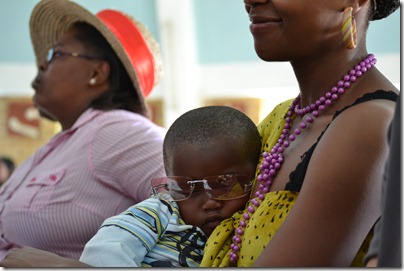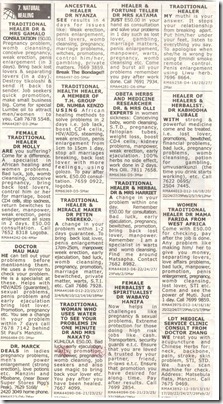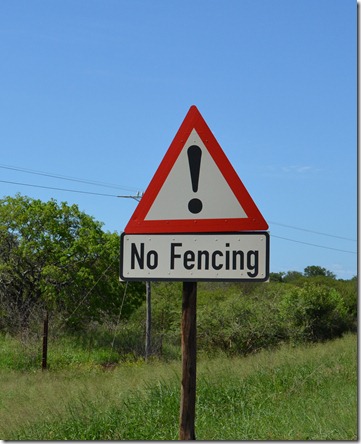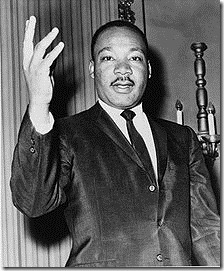The coming of a new year gives us a reason to reflect on the year that was. Inevitably, we notice how fast time goes by and how, in a relatively short time, so much can change. That notion of mutability was amplified for us in 2011.
One year ago, my wife Beth and I both had jobs we loved. We lived in a comfortable house in a quiet sub-division where we knew our neighbors. We had a great support network of friends and family. We drove cars that were paid off. Our daughter had every luxury a one-year old could want. Heck, one year ago, there was probably snow on the ground, Christmas candy on the table, a Netflix movie streaming over the Internet and left over food from our favorite restaurants in the fridge.
Today, as I am writing this reflection, I am sitting in the dark because a summer storm has knocked electricity out. My whole family is sweating because it hit the high 90s today and the humidity is unbearable. My back hurts from cutting the grass with a glorified machete. Going to town today to get our mail and groceries meant 30 minutes on dirt roads through the bush and then another 10-15 on “tar roads.” We are still mourning the loss of our dog that was killed by a 7’ black mamba. Everywhere around us people are dying of HIV, TB and neglect.
One year ago we lived in Bowling Green, Kentucky. Today we live in Swaziland, Africa. And you know what? I wouldn’t change a thing.
In January of last year Beth was teaching, I was preaching, Mikayla was playing and life seemed normal. By March we had begun selling our stuff, saying the first of our goodbyes, making last minute arrangements and preparing for a huge transition. In July, everything we ever owned was either sold, stored, loaned out or in our suitcases and we would spend 72 traveling from the life as we knew it to the bush of Swaziland. A month later we had taken in two TB positive twins as foster parents, had experienced oppressive heat of the Swaziland lowveld, and begun to learn what it means to live in a new culture. By the end of the year, while still far from full adjusted, we had begun to accept our new normal.
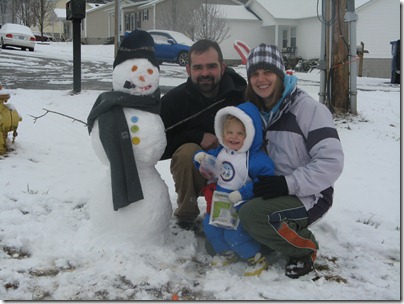
January in the States
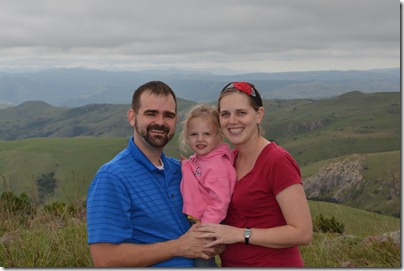
December in Swaziland
Suburbia to Savannah in a year may sound like an incredibly quick transition, but in reality it was the culmination of nearly 5 years of planning, praying and preparing. In 2007, Beth and I began to take inventory of our lives and started talking about our long term goals. Up until then, our lives had floated along a very positive trajectory; we were very happy with the way our lives were turning out, even if we weren’t overt about planning. But, slowly we realized that all the things in life we wanted to do could not co-exist. We could not commit to staying in Bowling Green to make a difference while also talking about pursuing Ph.Ds at distant colleges. We couldn’t talk about living overseas while also talking about living in intentional community with our friends. Simply put, we had to make a decision about which direction our lives would take in the coming years.
You would think a big decision like that would be difficult, but it only took one conversation over dinner to decide that at some point in our lives, while we raised our kids who were yet to come, we wanted to experience life outside the United States. I think even early on we realized that it was not important to have all the details figured out, but rather we had to know what general direction we were headed and then be faithful in pursuing it.
Over the next several years we researched opportunities, got in contact with people on the ground doing ministry, and gradually allowed our future to be shaped. It was a lesson in balancing intentionality with ambiguity. We had to learn how to stay on course pursuing a reality that we did not yet understand. We had to be bold in making decisions, but humble in allowing those decisions to change if needed. Slowly, as the details came into focus, we began planning for a life in Swaziland, Africa.
In July of 2010, Beth and I flew to Swaziland and met with over 20 individuals and organizations. Our goal was not to find a job, but to see what sort of work was going on and where we might fit into it. At the conclusion of the trip we were more confident than ever that we were on the right track in moving to Africa, but completely unsure of where we would end up. Once again, we continued planning, even if we didn’t know the details.
In October we were offered positions at Cabrini Ministries (http://www.cabriniministries.org) in the St. Philips. The irony is that St. Philips is in the lowveld bush; that means it is in the middle of nowhere and ridiculously hot. We had intentionally avoided researching any opportunities in the lowveld because of the environment. However, when Cabrini offered us the positions, we realized that even if the location was not right, the place was perfect. It offered housing, paid a modest salary, was a safe place to raise a family, and provided the opportunity to live immersed in Swazi culture. Most importantly, it was a place where good work was being done that we could be a part of and the skills we brought were exactly what they needed.
In July 2011, when we finally arrived, we realized very quickly that the faithfulness and diligence of our preparation had paid off. When we began looking to live overseas, we wanted to be a part of restorative work that was driven by community needs and assets. We also wanted to head to place where we could be shaped as individuals and a family. We certainly found both. Here at Cabrini we are in one of the most forgotten areas of the country all of our work is dedicated to serving the needs geographically around us. We have an HIV infection rate of nearly 40% and nearly half of children under 18 are either classified as orphans or vulnerable children. In response to this Cabrini offers a full-service HIV/TB clinic and a child care program that includes 7 levels of care from comprehensive residential care to one-time needs assistance. Last year over 2,000 people received direct care or treatment support from the organization. One of the most phenomenal things is that most of our staff began as clients and have been capacitated to do the work needed. For instance, our current database administrator was left for dead on her homestead dying of HIV and TB and was slowly nursed back to health by our nursing staff. 2 years ago she had never seen a computer and now she manages a healthcare database that is more robust than what the government hospital runs! Of our 55 staff members, all but 3 are from Africa, and 44 of them are from within 25 miles of Cabrini.
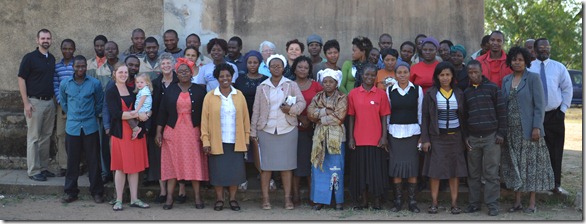
Cabrini’s Staff
In looking back at the transition we have gone through, it is easy to make things sound much more incredible than they really are. I can make the Kickert’s sound like heroes, but the reality is that most of the time, life is pretty mundane. On one hand crazy things happen here all the time (we have had two black mambas and a cobra killed within a couple yards of our front door in the last week), but then when I look at my actual day, I spend most of it behind a computer writing grant reports or doing IT work. Sometimes we spend 25% of our time without electricity, but we have decent access to internet. There are days where I may be in a national level planning meeting, only to come home and find that I have to chase cattle out of the garden. Last night Beth cooked cookies for the “Ambassador” to the EU (European Union) while I spent hours formatting report documents. I learned real quick that I can’t take myself too seriously.
A lot has happened in the last year, but all of it has been part of a dynamic yet consistent movement in our lives. Some people move overseas with only a few months notice; it took us 5 years. The hard part has not been the transition, it has been staying on course even when there isn’t a lot of action.
I have no idea what the next year or the next 5 years will hold for us, but I am confident it too will part of this direction we have been heading in for quite some time.
-bk
 I simply don’t have the words to express the amount of sadness and grief that instantly swept through the entire area. The mother, Nakiwe, was one of our brightest employees before she took a new job to be closer to her husband in Manzini. The father, Felix, is a police officer, but has worked with Cabrini in the education for years and years, he was apart of life on the mission even before the current sisters were. The grandfather was one of the major leaders in the church and in his chiefdom. Probably a quarter of our staff live within a couple kilometers of where the boys drowned.
I simply don’t have the words to express the amount of sadness and grief that instantly swept through the entire area. The mother, Nakiwe, was one of our brightest employees before she took a new job to be closer to her husband in Manzini. The father, Felix, is a police officer, but has worked with Cabrini in the education for years and years, he was apart of life on the mission even before the current sisters were. The grandfather was one of the major leaders in the church and in his chiefdom. Probably a quarter of our staff live within a couple kilometers of where the boys drowned.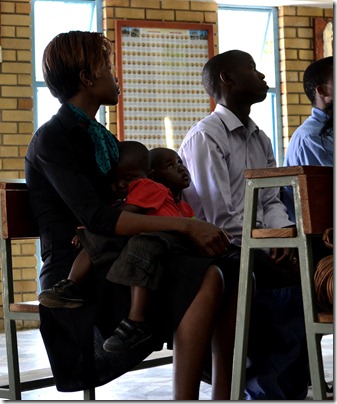 [Nakiwe, Sisandza,Tandziso and Felix Mabuza at the Feast of St. Philips]
[Nakiwe, Sisandza,Tandziso and Felix Mabuza at the Feast of St. Philips] 